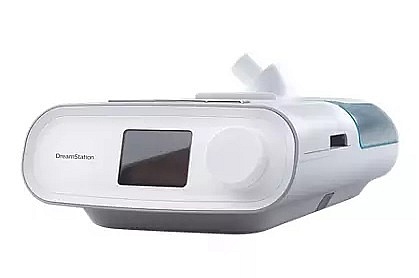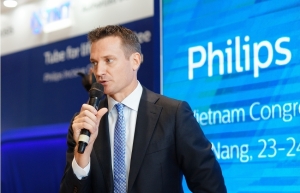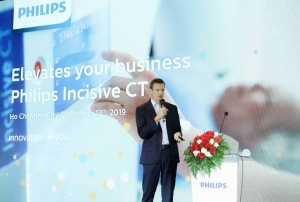Philips trims losses, stops selling sleep devices in US
 |
| Philips trims losses, stops selling sleep devices in US, photo philips.ca |
The firm trimmed its losses for 2023 compared with the previous year, as it seeks to bounce back from what it had described as a "very difficult" 2022.
Philips posted losses of 463 million euros over the full year, compared with 1.6 billion euros in 2022, with chief executive Roy Jakobs hailing "strong results."
"While there is more work to be done, the progress we achieved in a volatile world lays a solid foundation for sustained performance," said Jakobs.
Since 2021, the company has been battling a series of crises over its DreamStation machines for sleep apnoea, a disorder in which breathing stops and starts during sleep.
"Resolving the consequences of the Respironics recall for our patients and customers is a key focus area and I acknowledge and apologise for the distress and concern caused," said Jakobs.
The firm said it had clinched a "consent decree" deal with US authorities that consists of a "roadmap" of targets to allow Philips to conform with regulatory requirements.
"Until the relevant requirements of the consent decree are met, Philips Respironics will not sell new... sleep therapy devices or other respiratory care devices in the US," the company said.
It said it had set aside a provision of 363 million euros in the fourth quarter to settle the deal, which still needs to be finalised and requires court approval.
"We are fully committed to complying with the consent decree, which is an important step and provides a clear path forward," said Jakobs.
The firm's latest woes came in November when the US Food and Drug Administration warned that its new "DreamStation 2" machine to help patients sleep risked overheating.
The US body said it had received reports "such as fire, smoke, burns, and other signs of overheating" from people using the machine.
Philips said it had filed 270 reports of possible malfunctions with the FDA that covered a three-year period.
The overheating issue was unrelated to a recall of sleep machines in 2021 that sent the company into turmoil.
In that recall, the FDA said foam in the machine could potentially be breathed in or swallowed, posing possible health risks to patients.
The recall and provisions for possible legal settlements pushed the firm deep into the red in 2022 and led to the loss of thousands of jobs.
The company has already completed the vast majority of the recalls and announced in May that independent tests showed the respirators were "unlikely" to harm patients.
Financially, the firm has been fighting back, posting stronger third-quarter sales and profits that prompted it to raise its 2023 full-year outlook.
It recorded a net profit of 90 million euros ($95 million) in the third quarter, compared with a loss of 1.3 billion during the same period last year.
The firm was also in the black in the fourth quarter, posting a profit of 38 million euros. It lost 105 million euros in the same period last year.
Once famous for making lightbulbs and televisions among other products, Amsterdam-based Philips in recent years has sold off its subsidiaries to focus on medical care technology.
 | Philips reducing neonatal mortality by supporting Red River Run Philips Vietnam, a leader in health technology, made an effort to support to the Red River Run, to reduce neonatal mortality and promote health of newborns and mothers in Vietnam. |
 | Philips shines at Vietnam Congress of Radiology 2019 Philips showcased a new portfolio of innovative solutions at Vietnam Congress of Radiology 2019, comprising of imaging systems, intelligent software applications, and services. |
 | Philips expands diagnostic imaging portfolio with the new Incisive CT platform Royal Philips, a global leader in health technology, has just unveiled Incisive CT to help imaging departments and healthcare organisations meet their most pressing financial, clinical and operational goals. |
What the stars mean:
★ Poor ★ ★ Promising ★★★ Good ★★★★ Very good ★★★★★ Exceptional
 Tag:
Tag:
Related Contents
Latest News
More News
- PM outlines new tasks for healthcare sector (February 25, 2026 | 16:00)
- Ho Chi Minh City launches plan for innovation and digital transformation (February 25, 2026 | 09:00)
- Vietnam sets ambitious dairy growth targets (February 24, 2026 | 18:00)
- Masan Consumer names new deputy CEO to drive foods and beverages growth (February 23, 2026 | 20:52)
- Myriad risks ahead, but ones Vietnam can confront (February 20, 2026 | 15:02)
- Vietnam making the leap into AI and semiconductors (February 20, 2026 | 09:37)
- Funding must be activated for semiconductor success (February 20, 2026 | 09:20)
- Resilience as new benchmark for smarter infrastructure (February 19, 2026 | 20:35)
- A golden time to shine within ASEAN (February 19, 2026 | 20:22)
- Vietnam’s pivotal year for advancing sustainability (February 19, 2026 | 08:44)






















 Mobile Version
Mobile Version